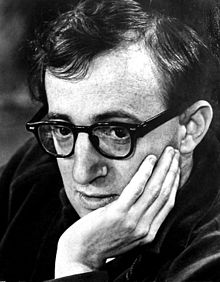
Woody Allen has acted in, directed, and written many films starting in the 1960s. His first film was the 1965 comedy What's New Pussycat?, which featured him as both writer and performer. Feeling that his New Yorker humor clashed with director Clive Donner's British sensibility, he decided to direct all future films from his own material. He was unable to prevent other directors from producing films based on previous stage plays of his to which he had already sold the film rights, notably 1972's successful film Play it Again, Sam from the 1969 play of the same title directed by Herbert Ross.
Allen's directorial debut, the 1966 film What's Up, Tiger Lily?, was a dramatic Japanese spy movie re-dubbed in English with completely new, comedic dialog. He continued to write, direct, and star in comedic slapstick films such as Take the Money and Run (1969), Bananas (1971) and Sleeper (1973), before finding widespread critical acclaim for his romantic comedies Annie Hall (1977) and Manhattan (1979); he won Academy Awards for Best Director and Best Original Screenplay for the former. Despite being influenced by European art cinema and venturing into more dramatic territory, with Interiors (1978) and Another Woman (1988) being prime examples of this transition, he continued to direct several comedies.
In addition to works of fiction, Allen appeared as himself in many documentaries and other works of non-fiction, including Stanley Kubrick: A Life in Pictures, Wild Man Blues and The Concert for New York City. He has also been the subject of and appeared in three documentaries about himself, including To Woody Allen, From Europe with Love in 1980, Woody Allen: A Life in Film in 2001 and the 2011 PBS American Masters documentary, Woody Allen: a Documentary (directed by Robert B. Weide). He also wrote for and contributed to a number of television series early in his career, including The Tonight Show as guest host.
According to Box Office Mojo, Allen's films have grossed a total of more than $575 million, with an average of $14 million per film (domestic gross figures as a director). Currently, all of the films he directed for American International Pictures, United Artists and Orion Pictures between 1965 and 1992 are owned by Metro-Goldwyn-Mayer, which acquired all the studios in separate transactions. The films he directed by ABC Pictures are now property of American Broadcasting Company, who in turn licensed their home video rights to MGM.